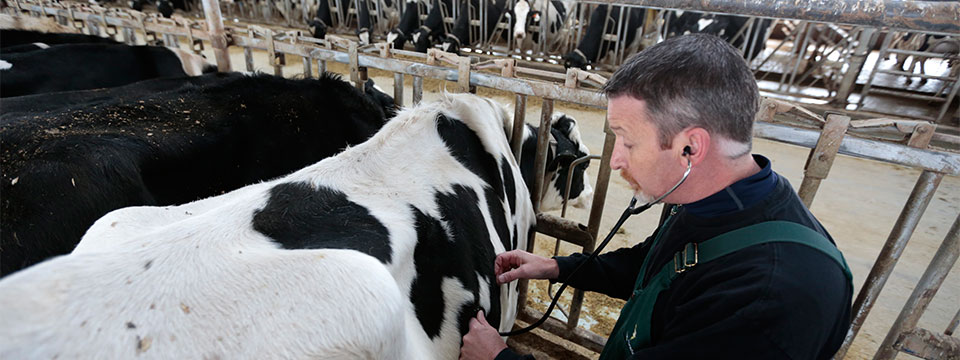
Arriving at work at 4:30 a.m. Driving two hours. Spending six hours on a farm sticking your arm up a cow’s rectum preg-checking the animal. Then driving back another two hours back to Iowa State University.
It’s all in a day’s work for the veterinarians and fourth year students with Iowa State’s Veterinary Field Services (VFS).
“It’s hard work but it’s what I like to do,” said Dr. Pat Gorden, VFS operations director. “Going out into the field keeps me, the other veterinarians and our students in touch with animals.
“It’s what we were trained to do.”
Iowa State’s Veterinary Field Services offers on-farm animal service to producers throughout a five county area around Ames. They also do daily visits to the College of Agriculture and Life Sciences’ Dairy Farm where they treat the farm’s hospital cows.
Beef and dairy cattle represent up to 80 percent of the VFS “farm” calls. The staff of clinicians also treat swine, sheep, goats and a small number of camelids. Equine needs are filled by the Equine Field Services a separate unit within the College of Veterinary Medicine.
Individual animal and herd health services provided by Veterinary Field Services include vaccinations, dewormings and diagnosis and treatment of individual animal diseases. Veterinarians also consult with the client on herd performance, routine production procedures and nutrition.
In addition to the professional veterinarian staff, Iowa State fourth-year students can elect to participate in a two-week rotation with Veterinary Field Services. There are typically four students on each two-week rotation throughout the year.
Gorden says the rotation exposes Iowa State veterinary students to clinical skills they will need after graduating. They also perform procedures not normally seen at the Large Animal Hospital on campus.
“The fourth-year students are exposed to far more animals out in the field than we do in the hospital,” Gorden said. “Students get to see what a realistic day-to-day veterinary practice is like and what role a veterinarian plays in making sure farms are financially successful.”
October 2015
